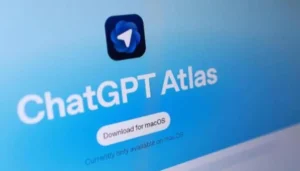San Francisco-based OpenAI has officially launched Atlas, its first web browser, signaling a bold challenge to Google’s Chrome.
Designed to integrate seamlessly with its popular AI chatbot, ChatGPT, Atlas aims to revolutionize how users search and interact online. The browser debuted Tuesday on Apple laptops, with plans to expand to Windows, iOS, and Android soon.
CEO Sam Altman described Atlas as a “once-a-decade opportunity to rethink what a browser can be and how to use one.” The launch marks OpenAI’s latest effort to monetize its 800 million-user base and diversify beyond subscriptions, potentially tapping into digital advertising revenues traditionally dominated by Google.
Aiming to Redefine Internet Navigation
Atlas introduces a key feature called “agent mode,” which allows ChatGPT to autonomously browse, click, and analyze online content on a user’s behalf — leveraging browsing history and learning preferences to provide contextual answers. Altman envisions a future where chatbot interactions replace traditional URL bars, calling tabs “great but outdated.”
Analyst Paddy Harrington from Forrester cautioned that OpenAI faces an uphill battle against Chrome’s 3 billion global users, describing it as “competing with a giant who has ridiculous market share.” Google’s browser, bolstered by its Gemini AI integration, remains dominant — yet Chrome’s rise from underdog in 2008 to market leader may serve as a roadmap for OpenAI.
AI Search Raises New Industry and Ethical Questions
Atlas’s launch intensifies debates around AI-driven search and its implications for publishers, privacy, and information accuracy. With 74% of Americans under 30 now using AI for online searches, reliance on summarized AI content threatens to erode web traffic to traditional news sites.
OpenAI already faces lawsuits from outlets like The New York Times over alleged copyright violations. A new European Broadcasting Union study found nearly half of AI assistants’ responses — including ChatGPT and Google’s Gemini — fell short of journalistic quality standards.
As OpenAI steps into Google’s domain, Atlas could reshape how billions access the web — or reignite questions about who truly controls the information we consume.
Note: We are also on WhatsApp, LinkedIn, and YouTube to get the latest news updates. Subscribe to our Channels. WhatsApp– Click Here, YouTube – Click Here, and LinkedIn– Click Here.



